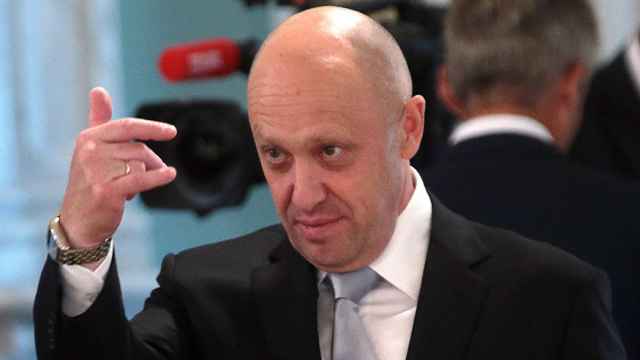Could Milanese DJ Benny Benassi ever have imagined that his track “Satisfaction” would spark an almost revolutionary upheaval in Russia?
In the early 2000s, my girlfriend, Irina, and I flew in Benny Benassi and his brother, Alle, for a number of concerts and parties in Moscow. I remember how, in the dressing room after one set, I began cursing the Russian authorities, to which Alle replied: “How can you complain about anything in a country with such great chicks?”
Now, 15 years later, a desire to impress those wonderful women has sparked a surprising chain of events. On the revolutionary date of Oct. 17, cadets at the Ulyanovsk Civil Aviation Institute dreamed up an unusual gift for their girlfriends: a video parodying Benassi’s “Satisfaction.”
The idea, of course, was not entirely new. British soldiers had done so before and a group of young Russians had already made a version of the video that included girls at a snowy dacha wearing only underwear and felt boots.
For some reason, the contrast in Benassi’s original 2003 video between the supple, bikini-clad, curvaceous models and the drills and jackhammers they held in their hands has inspired young men to create their own versions of “Satisfaction.”
This time, the fourteen Ulyanovsk freshmen filmed their video in their dormitory using everyday objects like mops, brushes, irons, and drills. They also dressed up like the Village People or in the style of artist Tom of Finland — a fact that proved crucial later. They wore briefs (thankfully, not G-strings), neckties and bowties against bare chests, their uniform caps, leather belts, suspenders and heavy boots.
No sooner did the video first appear on YouTube than a storm broke.
First, the head of education policy, and soon the institute’s rector, Sergei Krasnov, angrily condemned the students, accusing them of blasphemy, amorality and blemishing the honor of the institute and Russian pilots in general.
The rector even compared the cadets to the odious group Pussy Riot, even though their video clearly had no religious connection. The Federal Air Transport Agency (Rosaviatsia), the parent organization of the institute, quickly set up a commission to investigate the shocking incident and issued a statement saying it would take appropriate action, possibly going as far as expelling the students.
Ulyanovsk Governor Sergei Morozov made similar statements. Amusingly, it was the young men’s decision to dance in their uniform caps that proved to be their undoing. Officials could not bring themselves to comment publicly on the erotic or gay connotations of the video, instead focusing their charges on the boys’ inappropriate use of their professional uniforms.
This severe reaction is not unprecedented in modern Russia. In addition to the current case against Moscow theater director Kirill Serebrennikov and a scandal over the controversial staging of the opera “Tannhauser” in Novosibirsk several years ago, there have been at least two absurd episodes involving insidious Western dances.
Both involved “twerking” — in one case near a war memorial in Novorossiysk, and in another, in a performance of “Winnie the Pooh and the Bees” at a children’s festival in Orenburg.
It seemed that this time the result would be yet another shameful episode in the life of modern medieval Russia, another triumph of the sanctimoniousness, cowardice and conservatism to which Russians have unfortunately become accustomed.
But something completely unprecedented happened.
Social networks exploded in indignation. One post aptly summed up the general mood: “When will zombies finally stop attacking the living?” But more importantly, within days, hundreds of students from every corner of Russia recorded their own “Satisfaction” videos in a show of solidarity with the Ulyanovsk cadets.
The first were students of the agriculture vocational school in Ryazan, the hometown of many of the future pilots. Soon, fun-loving videos of young men and women dancing techno-style in their underwear began pouring in: construction students, search and rescue cadets, future nurses, equestrians, swimmers dancing in a pool, biathletes, sales clerks from Dagestan of all places, and many others — even a group of pensioners from St. Petersburg.
Without having coordinated, they recorded their own version of the scandalous video, essentially creating an enormous flash mob. This seemingly spontaneous show of widespread solidarity had an impact.
The sanctimonious crowd and those who favor a more punitive approach to educating youth suddenly began backpedaling: Governor Morozov softened his tone, saying that, although a problem existed, extreme measures were unnecessary. Other critics also suddenly fell silent.
Subservient state-run channels that had earlier inflamed the scandal with patriotic slogans and claims that the cadets had “insulted the feelings of veterans” now made no more mention of the episode.
Without having coordinated, they recorded their own version of the scandalous video, essentially creating an enormous flash mob. This seemingly spontaneous show of widespread solidarity had an impact.
Only two high-profile politicians spoke out on the subject, the progressive Yekaterinburg Mayor Yevgeny Roizman, and the occasionally clear-thinking head of the Liberal Democratic Party Vladimir Zhirinovsky. Both voiced support for the students and praised them for their sharp wit and excellent physical condition.
As it stands, the cadets apparently do not face expulsion.
For all the uniqueness of this story, it is probably safe to draw several general conclusions from it. First: Russian youth today differ significantly from those of even a few years ago.
They are braver, more independent, exhibit greater initiative and are more outspoken about their self-worth. Of course, it was not opposition leader Alexei Navalny who “awakened” them and there is no guarantee that they will take an interest in politics, but for the first time in several decades, the youth are proving a serious factor in public life.
And it is interesting that every time the youth express themselves through public rallies, countless rap battles, or dancing flash mobs, it takes the older generations by surprise and baffles sociologists.
Second, this is the umpteenth time that officials — especially at the regional level — have buckled and backtracked in the face of negative public opinion in conflicts over environmental, urban planning or cultural issues. Here, a powerful grassroots display of solidarity upset plans to make an example out of the “unpatriotic” cadets. The moral is that bold action brings results.
Finally, commenting on the video for news outlets and radio stations, I’ve tried to do justice by these young men, explaining that they are parodying the type of male striptease seen in comedies like “The Full Monty.” Each time, I’ve tried to sidestep the obvious issue of homoeroticism.
What the gatekeepers of lofty morality actually found shocking about the video was the homoerotic nature of the young men’s dancing, costumes, and manners. I admit that it also surprised me: Ulyanovsk is a relatively small provincial city, and would normally be a bastion of sexual conservatism.
Then how to explain the numerous “copycat” videos posted in support of the students — all shot in that same perverse style? The theory that this was a gay parade of epic proportions seems unlikely. But what could it mean?
Were all these people simply emulating Western style? Was it a deliberate provocation? Or was it a spontaneous, possibly even unconscious protest against the official homophobic propaganda? I do not know, and will not hazard a guess.
Here’s hoping that all ends well for the future pilots from Ulyanovsk. With any luck, this generally unhappy country will experience many more such happy endings.
Artemy Troitsky is a journalist and teacher in Tallinn, Estonia. The views and opinions expressed in opinion pieces do not necessarily reflect the position of The Moscow Times.
A Message from The Moscow Times:
Dear readers,
We are facing unprecedented challenges. Russia's Prosecutor General's Office has designated The Moscow Times as an "undesirable" organization, criminalizing our work and putting our staff at risk of prosecution. This follows our earlier unjust labeling as a "foreign agent."
These actions are direct attempts to silence independent journalism in Russia. The authorities claim our work "discredits the decisions of the Russian leadership." We see things differently: we strive to provide accurate, unbiased reporting on Russia.
We, the journalists of The Moscow Times, refuse to be silenced. But to continue our work, we need your help.
Your support, no matter how small, makes a world of difference. If you can, please support us monthly starting from just $2. It's quick to set up, and every contribution makes a significant impact.
By supporting The Moscow Times, you're defending open, independent journalism in the face of repression. Thank you for standing with us.
Remind me later.








